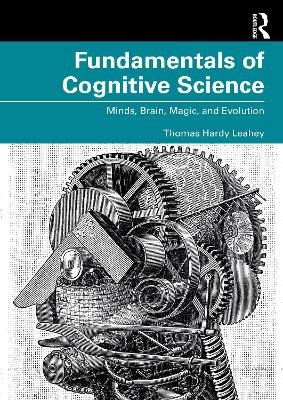
Fundamentals of Cognitive Science
Minds, Brain, Magic, and Evolution
Seiten
2022
Routledge (Verlag)
978-0-367-33916-6 (ISBN)
Routledge (Verlag)
978-0-367-33916-6 (ISBN)
Fundamentals of Cognitive Science draws on research from psychology, philosophy, artificial intelligence, linguistics, and neuroscience to provide an engaging and student-friendly introduction to this interdisciplinary field. Whilst structured around traditional cognitive psychology, the book also looks at cognitive neuroscience, and magic.
Fundamentals of Cognitive Science draws on research from psychology, philosophy, artificial intelligence, linguistics, evolution, and neuroscience to provide an engaging and student-friendly introduction to this interdisciplinary field. While structured around traditional cognitive psychology topics, from attention, learning theory, and memory to information processing, thinking, and decision making, the book also looks at neural networks, cognitive neuroscience, embodied cognition, and magic to illustrate cognitive science principles.
The book is organized around the history of thinking about the mind and its relation to the world. It considers the evolution of cognition and how it demonstrates how our current thinking about cognitive processes is derived from pre-scientific philosophies and common sense, through psychologists’ empirical inquiries into mind and behavior as they pursued a science of cognition and the construction of artificial intelligences. The architectures of cognition are also applied throughout, and the book proposes a synthesis of them, from traditional symbol system architectures to recent work in embodied cognition and Bayesian predictive processing. Practical and policy implications are also considered but solutions are left for the readers to determine.
Using extended case studies to address the most important themes, ideas, and findings, this book is suitable for upper-level undergraduate and graduate courses in psychology and related fields. It is also suitable for general readers interested in an accessible treatment of cognitive science and its practical implications.
Please visit www.fundamentalsofcognitivescience.com for further resources to accompany the book.
Fundamentals of Cognitive Science draws on research from psychology, philosophy, artificial intelligence, linguistics, evolution, and neuroscience to provide an engaging and student-friendly introduction to this interdisciplinary field. While structured around traditional cognitive psychology topics, from attention, learning theory, and memory to information processing, thinking, and decision making, the book also looks at neural networks, cognitive neuroscience, embodied cognition, and magic to illustrate cognitive science principles.
The book is organized around the history of thinking about the mind and its relation to the world. It considers the evolution of cognition and how it demonstrates how our current thinking about cognitive processes is derived from pre-scientific philosophies and common sense, through psychologists’ empirical inquiries into mind and behavior as they pursued a science of cognition and the construction of artificial intelligences. The architectures of cognition are also applied throughout, and the book proposes a synthesis of them, from traditional symbol system architectures to recent work in embodied cognition and Bayesian predictive processing. Practical and policy implications are also considered but solutions are left for the readers to determine.
Using extended case studies to address the most important themes, ideas, and findings, this book is suitable for upper-level undergraduate and graduate courses in psychology and related fields. It is also suitable for general readers interested in an accessible treatment of cognitive science and its practical implications.
Please visit www.fundamentalsofcognitivescience.com for further resources to accompany the book.
Thomas Hardy Leahey is Professor Emeritus at Virginia Commonwealth University, USA. He has been President of the Society for Theoretical and Philosophical Psychology and the Society for the History of Psychology. He is a fellow of the American Psychological Association and a founding fellow of the Association for Psychological Science.
1. What Is a Mind?, 2. Mind Design, 3. Architectures of Cognition, 4. Learning, 5. Early Information Processing, 6. Memory, 7. The Higher Mental Processes: Thinking and Deciding: Are People Rational?, 8. Cognitive Neuroscience, 9. Evolution of Cognition: Human Minds as Adaptations
| Erscheinungsdatum | 01.07.2022 |
|---|---|
| Zusatzinfo | 6 Tables, color; 53 Line drawings, color; 48 Halftones, color; 101 Illustrations, color |
| Verlagsort | London |
| Sprache | englisch |
| Maße | 174 x 246 mm |
| Gewicht | 700 g |
| Themenwelt | Geisteswissenschaften ► Philosophie |
| Geisteswissenschaften ► Psychologie ► Allgemeine Psychologie | |
| Geisteswissenschaften ► Psychologie ► Verhaltenstherapie | |
| Informatik ► Theorie / Studium ► Künstliche Intelligenz / Robotik | |
| ISBN-10 | 0-367-33916-1 / 0367339161 |
| ISBN-13 | 978-0-367-33916-6 / 9780367339166 |
| Zustand | Neuware |
| Informationen gemäß Produktsicherheitsverordnung (GPSR) | |
| Haben Sie eine Frage zum Produkt? |
Mehr entdecken
aus dem Bereich
aus dem Bereich
Buch | Softcover (2024)
REDLINE (Verlag)
CHF 27,95
Eine kurze Geschichte der Informationsnetzwerke von der Steinzeit bis …
Buch | Hardcover (2024)
Penguin (Verlag)
CHF 39,20


